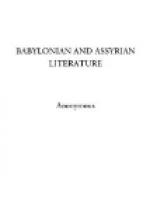[Footnote 22: “Masari,” guards of the palace, etc.]
[Footnote 23: See Sayce’s translation in the “Chal. Acc. of Gen.,” by Smith, p. 193.]
[Footnote 24: “Sedu,” spirits of prosperity.]
[Footnote 25: “Tar-u-mani izzu Sarri,” son of the faith, the fire of kings, or fire-king.]
[Footnote 26: “Kardunia,” the ancient name of Babylon.]
[Footnote 27: “Sami,” heavens (plural).]
[Footnote 28: “Tamu,” dawn or sunrise, day.]
COLUMN III
THE RESCUE OF ERECH BY IZDUBAR
Heabani, weary, eyes his native land,
And on his harp now lays his trembling hand;
The song has ended in a joyous lay,
And yet, alas! his hands but sadly play:
Unused to hope, the strings refuse their aid
To tune in sympathy, and heartless played.
Again the minstrel bows his head in woe,
And the hot tear-drops from his eyelids flow,
And chanting now a mournful melody,
O’er Erech’s fall, thus sang an elegy:
[1] “How long, O Ishtar, will thy face be turned,
While Erech desolate
doth cry to thee?
Thy towers magnificent, oh,
hast thou spurned?
Her blood like
water in Ul-bar,[2] oh, see!
The seat of thine own oracle
behold!
The fire hath
ravaged all thy cities grand,
And like the showers of Heaven
them all doth fold.
O Ishtar! broken-hearted
do I stand!
Oh, crush our enemies as yonder
reed!
For hopeless,
lifeless, kneels thy bard to thee,
And, oh! I would exalt
thee in my need,
From thy resentment,
anger, oh, us free!”
With eyes bedimmed with tears, he careful scans
The plain, “Perhaps the dust of caravans
It is! But no!! I see long lines of spears!
A warrior from the lifting cloud appears,
And chariots arrayed upon the plain!
And is the glorious omen not in vain?
What! no?” He rubs his eyes in wild surprise,
And drinks the vision while he loudly cries:
“Oh, joy! our standards flashing from afar!
He comes! he comes! our hero Izdubar!”
He grasps his harp inspired, again to wake
In song—the cry of battle now doth break.
“Nin-a-rad,[3] servant of
our great Nin,[4]
Shall lead our
hosts to victory!
God of the chase and war,
o’er him, oh, shine!
Tar-u-ma-ni iz-zu
sar-ri![5]
“Let Elam fall! the cause
of Accad’s woes,
Revenge of Erech,
be the cry!
This land our father’s
blessed, our king they chose,
Tar-u-ma-ni iz-zu
sar-ri!
Our holy fathers sleep upon
this plain,
We conquer, or
we here will die;
For victory, then raise the
cry, ye men!
Tar-u-ma-ni iz-zu
sar-ri!”




